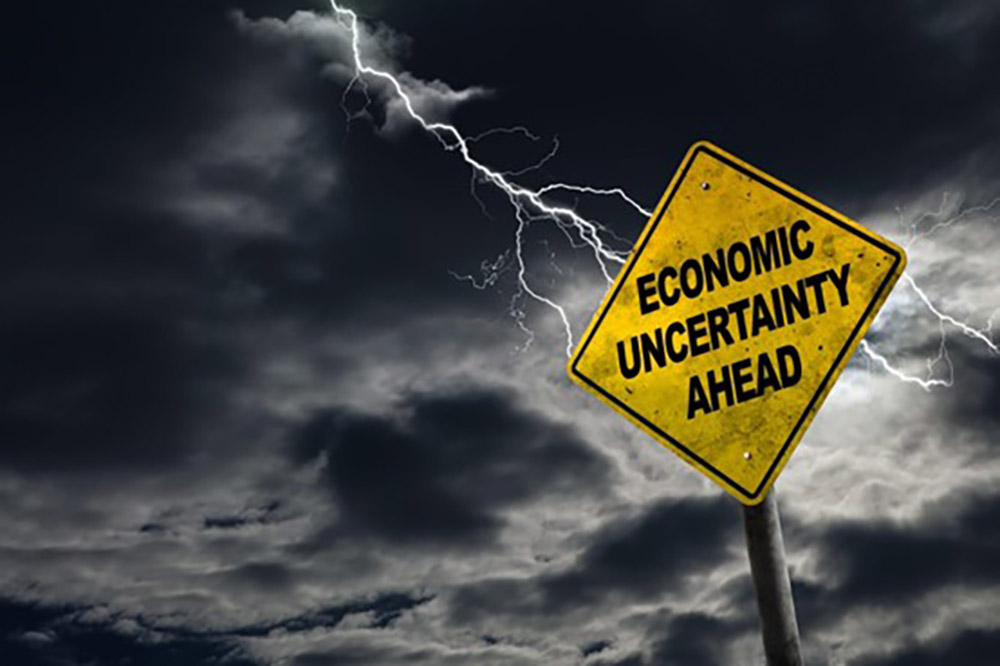
? 阿波羅全球管理公司(Apollo Global Management)指出,,滯脹是增長放緩與通脹上升的結(jié)合體,,而貿(mào)易戰(zhàn)則構(gòu)成“滯脹沖擊”。在由該公司首席經(jīng)濟(jì)學(xué)家托爾斯滕·斯洛克參與撰寫的最新研究報告中,,該公司預(yù)測一系列事件可能引爆經(jīng)濟(jì)災(zāi)難,。
阿波羅全球管理公司的最新報告認(rèn)為,特朗普政府近期宣布的多輪關(guān)稅政策,,可能在2025年夏季前引發(fā)經(jīng)濟(jì)衰退,。
根據(jù)阿波羅列舉的一系列潛在事件,本月特朗普在解放日發(fā)表關(guān)稅講話后,,從中國運往美國的海運集裝箱已經(jīng)減速,。考慮到集裝箱的運輸周期為20-40天,,因此到5月份集裝箱可能停止到達(dá)美國港口,。至5月中旬,這將預(yù)示著卡車運輸需求驟降,,隨后商店庫存告急,。這些信號意味著春季銷售疲軟,零售業(yè)與卡車運輸業(yè)可能在5月底至6月初開始裁員,。最終在2025年夏季,,美國將開始陷入全面衰退。
阿波羅的報告由首席經(jīng)濟(jì)學(xué)家托爾斯滕·斯洛克,、副主任拉維·沙和助理施盧蒂·蓋爾萬卡爾共同編寫,。報告描繪了黯淡的經(jīng)濟(jì)前景,本質(zhì)上是警告美國經(jīng)濟(jì)正因貿(mào)易沖擊加速滑向衰退,。
盡管特朗普的關(guān)稅計劃僅公布數(shù)周,,預(yù)警信號已然顯現(xiàn)。報告特別指出,,貿(mào)易戰(zhàn)會破壞供應(yīng)鏈并降低貿(mào)易量,,進(jìn)而導(dǎo)致經(jīng)濟(jì)活動停滯,會形成滯脹沖擊。與此同時,,貿(mào)易僵局通常會導(dǎo)致進(jìn)口商品漲價,,并減少競爭。滯脹是“增長放緩或停滯+通脹攀升”的可怕組合,。美國已經(jīng)四十年未出現(xiàn)持續(xù)的嚴(yán)重滯脹,。
阿波羅的研究報告警告稱,關(guān)鍵商業(yè)信心指標(biāo)正急速下挫,,消費者反應(yīng)模式更令人憂心,。
CEO信心萎縮
《首席執(zhí)行官》(Chief Executive)雜志的最新首席執(zhí)行官信心調(diào)查顯示,高管樂觀情緒持續(xù)消退,,62%的企業(yè)領(lǐng)袖預(yù)測未來六個月將出現(xiàn)增長放緩或衰退,。
調(diào)查發(fā)現(xiàn),在受訪首席執(zhí)行官中,,預(yù)測嚴(yán)重經(jīng)濟(jì)衰退的比例從3月的9%增長至4月的14%,。此外,年初約有84%的首席執(zhí)行官預(yù)期收入增長,,而在4月再次參與調(diào)查時,,僅有49%的首席執(zhí)行官預(yù)期2025年收入增長。
預(yù)期收入下降的首席執(zhí)行官比例則從年初的9%激增至4月的44%,。
首席執(zhí)行官信心暴跌的同時,,消費者樂觀前景也同步崩塌。
消費者信心驟降
阿波羅首席經(jīng)濟(jì)學(xué)家斯洛克上周日發(fā)布的新圖表顯示,,僅償還信用卡最低還款額的家庭比例創(chuàng)歷史新高,。
據(jù)費城聯(lián)儲銀行(Federal Reserve Bank of Philadelphia)披露,從信用卡余額中已表現(xiàn)出“消費者窘迫”的征兆,。根據(jù)美聯(lián)儲的數(shù)據(jù),,按最低額還款的賬戶比例創(chuàng)12年新高,違約指標(biāo)接近或刷新峰值,。
與此同時,,阿波羅的報告顯示,,美國民眾對失業(yè)的擔(dān)憂加劇,。
密歇根大學(xué)(University of Michigan)社會研究所的消費者調(diào)查顯示,4月消費者信心指數(shù)從3月的57驟降至52.1,。該研究所主任兼經(jīng)濟(jì)學(xué)家喬安妮·徐在更新報告中稱,,約三分之二的消費者認(rèn)為今年失業(yè)率將上升,這一比例是六個月前的兩倍,。
她補充道:“令人警惕的是,,消費者越來越擔(dān)憂收入前景惡化。”
密歇根大學(xué)的調(diào)查顯示,,預(yù)計今年收入增長的消費者不足半數(shù),,約三分之二認(rèn)為未來數(shù)月他們的購買力將持續(xù)縮水。(財富中文網(wǎng))
譯者:劉進(jìn)龍
審校:汪皓
? 阿波羅全球管理公司(Apollo Global Management)指出,,滯脹是增長放緩與通脹上升的結(jié)合體,,而貿(mào)易戰(zhàn)則構(gòu)成“滯脹沖擊”。在由該公司首席經(jīng)濟(jì)學(xué)家托爾斯滕·斯洛克參與撰寫的最新研究報告中,,該公司預(yù)測一系列事件可能引爆經(jīng)濟(jì)災(zāi)難,。
阿波羅全球管理公司的最新報告認(rèn)為,特朗普政府近期宣布的多輪關(guān)稅政策,,可能在2025年夏季前引發(fā)經(jīng)濟(jì)衰退,。
根據(jù)阿波羅列舉的一系列潛在事件,本月特朗普在解放日發(fā)表關(guān)稅講話后,,從中國運往美國的海運集裝箱已經(jīng)減速,。考慮到集裝箱的運輸周期為20-40天,,因此到5月份集裝箱可能停止到達(dá)美國港口,。至5月中旬,這將預(yù)示著卡車運輸需求驟降,,隨后商店庫存告急,。這些信號意味著春季銷售疲軟,零售業(yè)與卡車運輸業(yè)可能在5月底至6月初開始裁員,。最終在2025年夏季,,美國將開始陷入全面衰退。
阿波羅的報告由首席經(jīng)濟(jì)學(xué)家托爾斯滕·斯洛克,、副主任拉維·沙和助理施盧蒂·蓋爾萬卡爾共同編寫,。報告描繪了黯淡的經(jīng)濟(jì)前景,本質(zhì)上是警告美國經(jīng)濟(jì)正因貿(mào)易沖擊加速滑向衰退,。
盡管特朗普的關(guān)稅計劃僅公布數(shù)周,,預(yù)警信號已然顯現(xiàn)。報告特別指出,,貿(mào)易戰(zhàn)會破壞供應(yīng)鏈并降低貿(mào)易量,,進(jìn)而導(dǎo)致經(jīng)濟(jì)活動停滯,會形成滯脹沖擊,。與此同時,,貿(mào)易僵局通常會導(dǎo)致進(jìn)口商品漲價,并減少競爭,。滯脹是“增長放緩或停滯+通脹攀升”的可怕組合,。美國已經(jīng)四十年未出現(xiàn)持續(xù)的嚴(yán)重滯脹。
阿波羅的研究報告警告稱,關(guān)鍵商業(yè)信心指標(biāo)正急速下挫,,消費者反應(yīng)模式更令人憂心,。
CEO信心萎縮
《首席執(zhí)行官》(Chief Executive)雜志的最新首席執(zhí)行官信心調(diào)查顯示,高管樂觀情緒持續(xù)消退,,62%的企業(yè)領(lǐng)袖預(yù)測未來六個月將出現(xiàn)增長放緩或衰退,。
調(diào)查發(fā)現(xiàn),在受訪首席執(zhí)行官中,,預(yù)測嚴(yán)重經(jīng)濟(jì)衰退的比例從3月的9%增長至4月的14%,。此外,年初約有84%的首席執(zhí)行官預(yù)期收入增長,,而在4月再次參與調(diào)查時,,僅有49%的首席執(zhí)行官預(yù)期2025年收入增長。
預(yù)期收入下降的首席執(zhí)行官比例則從年初的9%激增至4月的44%,。
首席執(zhí)行官信心暴跌的同時,,消費者樂觀前景也同步崩塌。
消費者信心驟降
阿波羅首席經(jīng)濟(jì)學(xué)家斯洛克上周日發(fā)布的新圖表顯示,,僅償還信用卡最低還款額的家庭比例創(chuàng)歷史新高,。
據(jù)費城聯(lián)儲銀行(Federal Reserve Bank of Philadelphia)披露,從信用卡余額中已表現(xiàn)出“消費者窘迫”的征兆,。根據(jù)美聯(lián)儲的數(shù)據(jù),,按最低額還款的賬戶比例創(chuàng)12年新高,違約指標(biāo)接近或刷新峰值,。
與此同時,,阿波羅的報告顯示,美國民眾對失業(yè)的擔(dān)憂加劇,。
密歇根大學(xué)(University of Michigan)社會研究所的消費者調(diào)查顯示,,4月消費者信心指數(shù)從3月的57驟降至52.1。該研究所主任兼經(jīng)濟(jì)學(xué)家喬安妮·徐在更新報告中稱,,約三分之二的消費者認(rèn)為今年失業(yè)率將上升,,這一比例是六個月前的兩倍。
她補充道:“令人警惕的是,,消費者越來越擔(dān)憂收入前景惡化,。”
密歇根大學(xué)的調(diào)查顯示,,預(yù)計今年收入增長的消費者不足半數(shù),,約三分之二認(rèn)為未來數(shù)月他們的購買力將持續(xù)縮水。(財富中文網(wǎng))
譯者:劉進(jìn)龍
審校:汪皓
? Stagflation is the combination of slow growth and rising inflation and trade wars are a “stagflation shock,” according to Apollo Global Management. In a new research note coauthored by chief economist Torsten Slok, the firm predicts a sequence of events that could lead to economic catastrophe.
The recent array of tariffs the Trump administration has announced have the potential to trigger a recession by summer 2025, according to a new report from Apollo Global Management.
Based on Apollo’s potential sequence of events, shipping containers from China to the U.S. slowed down after President Trump’s Liberation Day tariff address this month. Allowing for 20-to-40 days travel time, containers shipped to U.S. ports could halt in May. By mid-May, that would portend a rapid slowdown in demand for trucking, which would be followed by less stock in stores for people to purchase. With those signs, that would mean sluggish sales in spring, while subsequent layoffs in retail and trucking could come by late May and early June. Then, in summer 2025, a full recession could take root.
The Apollo report, co-authored by chief economist Torsten Slok, associate director Rajvi Shah, and associate Shruti Galwankar, paints a bleak economic outlook and is essentially a warning that the U.S. economy is rapidly on pace for a recession due to trade disruptions.
Warning signs have already appeared even though Trump’s tariff plan was only announced weeks ago. The Apollo report specifically identifies trade wars as a source of stagflation shock because they cause economic activity to lag due to disruptions in supply chain and lower trade volumes. At the same time, the trade standoffs typically raise prices on the cost of imported goods while reducing competition. The dreaded stagflation results from a combination of slower or stagnating growth and increased inflation. There hasn’t been a sustained period of major stagflation in four decades.
The Apollo research note warns important business sentiment indicators are dropping in short order and the way consumers are responding is cause for serious concern.
Waning CEO Confidence
Chief Executive’s most recent survey of CEO confidence shows declining optimism, with 62% of top execs now predicting a slowdown or recession in six months.
CEOs surveyed who predicted a severe recession rose from 9% in March to 14% in April, Chief Executive’s monthly survey found. Furthermore, some 84% of CEOs reported anticipated revenue growth at the start of the year, while only 49% predicted that revenues would grow in 2025 when CEOs were queried again in April.
Only 9% of CEOs expected a revenue decrease at the start of the year, compared to 44% in the April survey.
A steep falloff in CEO optimism is coupled with a similar decline in a positive outlook among consumers.
Plummeting Consumer Sentiment
In a new chart on Sunday, Slok, Apollo’s chief economist, noted that a new record high share of households are only making minimum payments on credit card balances.
The Federal Reserve Bank of Philadelphia revealed that credit card balances are showing signs of “consumer distress.” The percent of accounts making minimum payments hit a 12-year high based on the Fed’s data, while delinquency metrics were close to or set new highs.
At the same time, people are increasingly worried they will lose their jobs, the Apollo report shows.
The University of Michigan’s Institute for Social Research’s Survey of Consumers saw its Consumer Sentiment Index drop to 52.1 in April, down from 57 in March. About two thirds of consumers think unemployment will rise this year, which is twice as many as six months ago, according to institute director and economist Joanne Hsu, who was quoted in an update.
“In an alarming development, consumers are increasingly worried that their income prospects may be worsening as well,” she continued.
Less than 50% think their own income will increase this year, and about two thirds believe their purchasing power will be whittled down in the coming months, the Michigan survey revealed.






